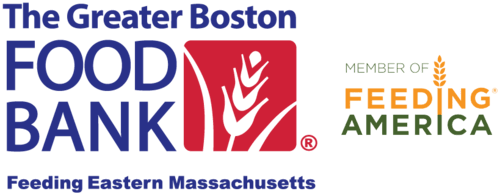Taking Advocacy Across the State
Taking Advocacy Across the State: Food Banks Organize First Annual MEFAP Roadshow
What do fresh asparagus from Chicopee, Haddock chowder from the Cape, and jars of everyone’s favorite super chunky peanut butter from a factory in Everett have in common? They are all nutritious, locally-sourced products purchased through the Massachusetts Emergency Food Assistance Program (MEFAP) and distributed to nearly 850 pantries, shelters, meal programs and mobile markets across Massachusetts.
In partnership with the Massachusetts Department of Agriculture (MDAR) and the Massachusetts State Food System Legislative Caucus, the Food Bank Coalition of Massachusetts (FBCMA), comprised of four regional food banks serving the Commonwealth (The Greater Boston Food Bank, Food Bank of Western Massachusetts, Merrimack Valley Food Bank and Worcester County Food Bank), hosted a first annual MEFAP Roadshow in May to educate the community about the value of MEFAP to the local farm and fishing industry, food production and manufacturing companies, and emergency food distribution partners statewide.
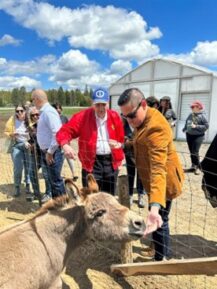
Senator Jake Oliveira (D-Ludlow) feeds a donkey (D-Chicopee) at McKinstry Market Garden, a food vendor for the Massachusetts Emergency Food Assistance Program (MEFAP).
Roadshow participants traveled across Massachusetts making three stops at MEFAP food vendor locations, including McKinstry Farms in Chicopee, the Cape Cod Commercial Fishermen’s Alliance (CCCFA) in Chatham, and Teddie Peanut Butter in Everett, all while learning about how MEFAP feeds people in every city and town in the Commonwealth and strengthens the local economy. In FY22, 42.4% of MEFAP dollars purchased food from Massachusetts suppliers.
MEFAP ensures a consistent supply of quality nutrient dense foods and locally grown fresh produce at no cost to a statewide network served by the FBCMA of nearly 1,000 emergency food providers, including pantries, shelters, meal programs and mobile markets. Each provider is a member of one of the state’s four food banks: The Greater Boston Food Bank, The Merrimack Valley Food Bank, The Food Bank of Western Massachusetts and The Worcester County Food Bank.
“MEFAP is an economic engine for our state. The program allows us to simultaneously feed people in every city and town in Massachusetts while supporting our local economy,” said Catherine D’Amato, The Greater Boston Food Bank President & CEO.
McKinstry Market Garden: Chicopee
Reverend Gary Grimes from the First Congregational Church of Chicopee, home to a food pantry that receives food from the Food Bank of Western Massachusetts, cited having recently provided food to someone who was struggling to pay their electricity bills. “Because of local farms like McKinstry Farms and the MEFAP program, we’re able to provide fresh produce to people who don’t get that on a regular basis. We’re able to get this food directly from the food bank.”
Due to the increased need for food security assistance because of the high cost of food and the end of pandemic benefits, more people are turning to food pantries than ever before. The food banks need greater support through MEFAP to purchase food for our partners serving the 351 cities and towns statewide.
“Thank you for what you have done to make sure food reaches the communities that I grew up in, communities facing food insecurity,” said Senator Adam Gomez (D-Springfield), speaking of his past experiences with hunger. “Without your sweet corn, and all the vegetables you grow, some people might not eat today. The food banks and MEFAP are essential, especially during times of crisis and need, they are stepping up to the plate and feeding our children, nourishing our homes.”
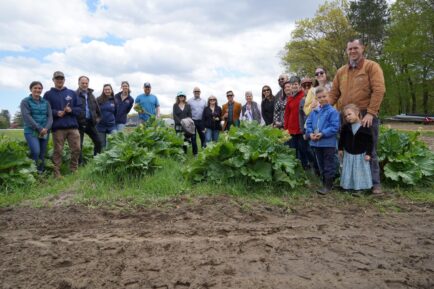
Senator Adam Gomez (D-Springfield), Senator Jake Oliveira (D-Ludlow) Representative Shirley Arriaga (D-Chicopee), and Representative Pat Duffy (D-Holyoke), Billy Crawford of New England Apiaries, hunger-relief and agriculture advocates from around the state among rows of rhubarb.
Cape Cod Commercial Fishermen’s Alliance and Cape Cod Family Pantry: Chatham and Harwich
At the second stop on the Roadshow, participants gathered at the Chatham Fish Pier overlooking the harbor.
To date, $1.4 million worth of seafood has been purchased from the Cape Cod Commercial Fishermen’s Alliance through MEFAP and distributed across the state. “This program is amazing—it’s helping people in need and also the fishing community,” remarked Captain Jesse Rose, a veteran fisherman with the CCCFA.
“MEFAP is a shining star in our department. It is a unique program that has support from the legislature and strong public private partnerships,” said MDAR Commissioner Ashley Randle, who leads the state agency responsible for administering the MEFAP contract. Commissioner Randle noted the continued opportunities for such partnerships to support local farming and fishing industries while providing communities in need with food from local sources. “This kind of collaboration is a priority in the Healey- Driscoll administration. My hope is that we continue to build MEFAP for years to come,” said Commissioner Randle.
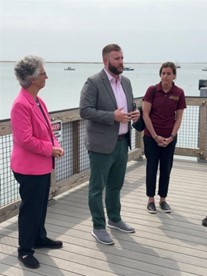
Left to right: Representative Sarah Peake (D-Provincetown), Senator Julian Cyr (D-Truro), and MDAR Commissioner Ashley Randle provide remarks on the value of MEFAP at the Chatham Fish Pier.
“One in three people in the Commonwealth are food insecure,” said Representative Sarah Peake (D-Provincetown), citing The Greater Boston Food Bank’s 2022 statewide study on Food Equity and Access. “It shouldn’t have to feel like a miracle that you can drop a couple of eggs in a pan and have a nourishing breakfast.”
Chris Menard, Executive Director of The Family Pantry of Cape Cod, led the group on a tour of the Harwich pantry following the speaking program, sharing how they currently serve 650-700 families per week— over 40% more people than this time last year and the highest volume she has ever seen. “The families on Cape Cod who we serve are working. They come because they can’t make ends meet. These are your landscapers, your grocery clerks, your teachers, your nurses—all the folks who make the tourist economy work,” said Menard. “Our job is to feed these families.”
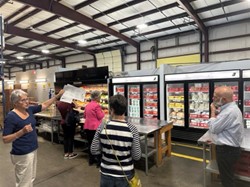
Chris Menard, Executive Director of The Family Pantry of Cape Cod, leads participants on a tour of the pantry.
The largest pantry on the Cape, the Family Pantry of Cape Cod has received over 9 million pounds of food from GBFB through the MEFAP program in the past 5 fiscal years, equating to nearly 7.5 million meals for people in need.
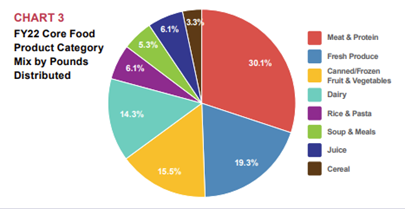
From GBFB’s MEFAP FY22 Report: GBFB_MEFAPFY22_FINAL.pdf
Teddie Peanut Butter/ the Leavitt Corporation: Everett
The final stop along the roadshow was in Everett at Teddie Peanut Butter, a family run business and producer of the popular spread for nearly 100 years.
Participants were led on a tour of the facility followed by remarks from MEFAP stakeholders. Everett Senator and Food Systems Caucus Chair Sal DiDomenico, speaking of the competing priorities at the statehouse, remarked, “We have to make sure they know that this [$10.5M increase in MEFAP funding reflected in his amendment] is not extra. This is a necessity to keep up with inflation and the demand we’re seeing across the Commonwealth. We know every dollar invested by the state in MEFAP goes to a good purpose.”
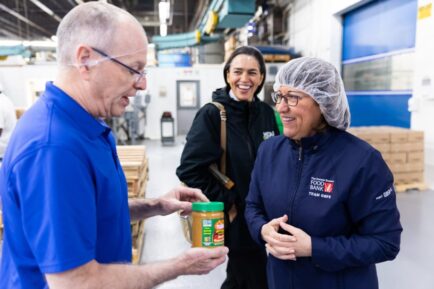
Left to right: Teddie Peanut Butter COO Jamie Hintlian, MDAR Program Coordinator Rose Arruda, GBFB COO Cheryl Schondek on a tour of the Teddie Peanut Butter factory.
Over the 30+ year partnership with GBFB, Teddie Peanut Butter has donated hundreds of thousands of pounds of peanut butter. Through the MEFAP program, GBFB has purchased nearly $4 Million in product from Teddie, according to Cheryl Schondek, GBFB COO. “3,362,775 pounds. That’s a lot of peanut butter sandwiches.”
Representing emergency food providers, Juan Camilo Saavedra, Director of Food and Nutrition at La Colaborativa in Chelsea, spoke of the need for fresh food that reflects clients’ cultural preferences. “The produce we receive through this program helps us diversify the foods that people are bringing home to their families.”
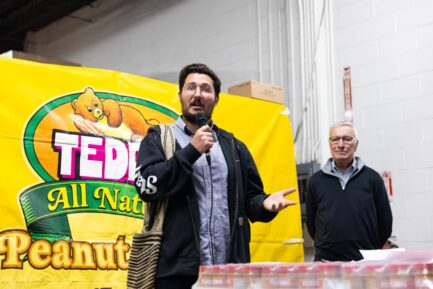
Left to right: Juan Camilo Saavedra, Director of Food and Nutrition at La Colaborativa, Teddie Peanut Butter CEO Mark Hintlian
FY24 State Budget Advocacy for MEFAP
This Spring, the House funded MEFAP at $31.2 million – level funding from the Governor’s budget proposal – while the Senate budget proposed $35 million. The Food Bank Coalition of Massachusetts requested an increase to $41 million for MEFAP in the FY24 budget through a Senate Amendment filed by Senator DiDomenico. With his leadership, a total of $36 million was secured in the final Senate budget.
Our call to action for the legislature is to support the Senate’s $36 million MEFAP allocation (or higher) in Conference Committee deliberations as they reconcile the two budgets to determine the final FY24 budget. Funding for the purchase of food is critically important now, as with the end of pandemic-era benefits, emergency food providers across the state are experiencing higher demand than ever before, and food orders are coming in faster than GBFB can restock the warehouse.
“We have an obligation in our society to give back to people who need it most,” said Senator DiDomenico. “MEFAP does that every single day.”
